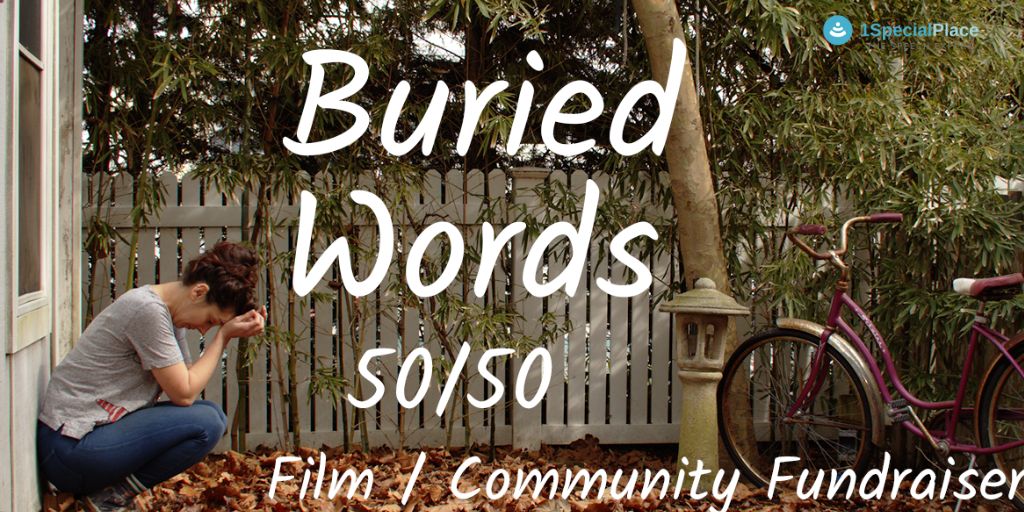
“Buried Words” – An Inspirational Film of a Person with Aphasia”
“Buried Words” – An Inspirational Film of a Person with Aphasia”
Buried Words, In today’s interview series, we bring to you an amazing journey filled with hope, positivity, and self-determination. This is the story of Ms. Nina Orris and her son Mr. Nicholas Orris, a filmmaker and video producer buriedwordsfilm.
Mr. Nicholas Orris is the Co-Writer and Director of the film “Buried Words”.
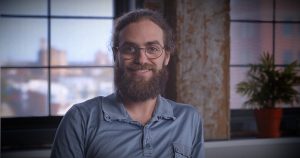
“Buried Words” is a heartening real-life movie based on the bond that Mr. Orris shared with his mother Ms. Nina Orris during her recovery from Aphasia. Through this movie, Mr. Orris hopes we can build a better world filled with empathy and positivity for persons with Aphasia and their loved ones.
Q. Please introduce yourself and your mother Ms. Nina Orris
My name is Nicholas Orris, I am a 29-year-old filmmaker by passion and video producer by trade. I grew up in Ambler PA with my brother Dan, making movies, playing in the woods, and listening/dancing to music. I currently live in Denver Colorado with my love Kacki, cat Sphinx creating video content and art.
My mother Nina Orris was a dancer for decades, and then was one hell of a saleswoman. Using her fiery no BS energy, she cuts to the truth of a situation without letting anyone stand in her way in life. She moved around a lot as a child in the Midwest, and eventually settled in the Greater Philadelphia Area. When my brother and I were finally out of the house attending FSU, my mother moved to downtown Philadelphia where she lived for several years, and in Philadelphia, she had her stroke. After that, she moved to Stone Harbour to live with her husband Glyn, and it was there that together we filmed Buried Words.
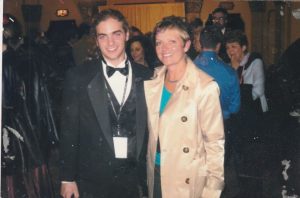
Growing up with her, she was kind of intense, but in a good way. She ingrained in my brother and I a sense of personal responsibility for our lives, work, worth, and well-being. My mom always encouraged my artistic and creative side (as long as my homework was done!). As my fascination with film grew, she encouraged it and fed it. A lover of classic films herself, we always have TCM on in the background.
Read a detail blog on Aphasia
I think back fondly on those years. I always found our conversations to be really meaningful and enlightening. During dinner or on drives we’d discuss life, goals, dreams, relationships, film, anything. I learned about deep and meaningful conversations through talking with my mom.
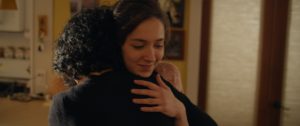
Traversing from one subject to the next and finding these great “A-hah!” moments and not knowing how we got there. I can recall being about 6 or 7 riding home from the mall with her (one of those alone times as a kid where we would have a good conversation I remember) and perfectly memorizing the conversation thread so I could share with her how cool I thought it was that we could bridge so many subjects through the course of one discussion. Honestly, a good conversation is one of those things I constantly yearn for in my life, even to this day.
Q. When did you first get the diagnosis and what were your immediate thoughts?
Post College – I moved back to PA in August of 2014, and then my mother had a stroke in November. I remember very clearly getting the phone call, what it was like to go and visit her that first time in the hospital when she had a lack of motor control and no speaking facilities whatsoever. Asking her to point to the Yes / No card was really hard. I was really scared that I would never hear my mom’s voice again, have the amazing conversations that we used to share.
I had moved back to PA after college with the intent to spend time with my parents learning from them with my older, more “Adult” perspective on things. For her to have a stroke 3 months after my arrival was like a slap from the universe…but it was also a blessing.
I remember the first time the Doctor came in and asked my mom “What is your name?”. Nicholas had to walk out, watching her struggle to say…well nothing at that time. I was really scared, and sad. Would I never find what I moved home to discover about myself and my family? Would I never have those conversations I valued so much and yearned to have again? I felt helpless and tiny.
The doctor told us what Expressive Aphasia was, and I was terrified. Like…she could genuinely never get her speech abilities back…or she could? I started reading up on Aphasia so I could be better with her and learned that helping in recovery immediately was so important.
I would be driving home, and I would play this Voicemail I had saved from her. In the Voicemail, she had put the phone down and didn’t realize it was on, answering the door to one of her friends, inviting them in, laughing, and catching up. It was a long voicemail, and I would just listen to her voice a while driving home, and cry, hoping to hear those tones once more.
I thought I had lost the mom I used to know. Nicholas thought the stroke had stolen away from us the meaningful experiences I had moved home to have. I thought everything was different and for the worse.
My father Mark Orris supported me greatly through these times, even offering me a job at his office in Hatboro so I would work closer to the city, rather than driving another 1hr away up to Bethlehem. He was always ensuring I had a better opportunity to support my mother,
Q. Share with us your journey through her diagnosis and intervention.
I would go care-take for her those first months while she regained motor control. Driving an hour or so 1 way to just be with her, help cook, take her to physical and speech therapy. I wanted to learn what the methods were for her practice, so I could continue to encourage her growth and practice at home.
At times we really weren’t understanding each other, I would be asking thirty different questions to figure out what she needed “is it this? Do you want that? are you hungry? Thirsty? Back hurt?” until with exacerbation she got out a single word, then I would know what it was, I would feel so stupid- like her body language was obvious when I thought about it, and it would be this laughable “Oh Jeez” kind of moment between us. Like “wow that’s all it was…” But with more of those, we developed a good understanding of the rhythms of our sharing and her nonverbal communication.
We would listen to classic rock, dance, and she would start to whisper-sing to old songs she knew so well. That was big for me, starting to hear her get the sounds out.
We learned how important the phrase “I had a stroke. I speak slowly.” was. Most people’s whole demeanor would change from impatience to intently listening. Pretty interesting I thought, stopped people’s mindless “Go-go-go” state of being, forced them to be a little more present at the moment. There were the occasional rude punks, but they didn’t bother my mom any, she’s tough.
Phone calls between us were REALLY challenging. I would call her to let her know when I was coming, rant about plans, and if we were lucky, she’d be able to just say “Okay”. I knew she wished to say more during those phone calls. They were really hard and left us both feeling hurt and drained it seemed to me.
Thinking back now it’s hard to say when she took a big turn for the better. I guess it’s that daylight savings effect, each day a little bit brighter than the last, the next a little more, until one day you think oh wow…this is way better than it was!
She could order food on her own out loud at restaurants. She would say just a few more words on the phone to me, and it didn’t feel like we were both going to break out in sobs after hanging up. More and more she could say what she meant, and each month, each year, I could hear her normal voice again. I remember hearing her answer the phone one day and say “Hello?” and it stopped me in my tracks…it was her voice…after a couple of years, I had forgotten how deeply ingrained the sound of her voice was in my being. A simple “Hello” with her full tones… triggered something so good in me.
Something I should note is that SHE was always still present and I learned that early on in the recovery when she still could barely say anything. During that time period, I was just opening my video production business and had a few close calls with scam jobs, and just bad opportunities.
Her simple nodding or strong hear shakes and facial expressions told me everything. I’d be explaining a job opportunity, debating the pros and cons and she’d manage to just say “No.” I would be stunned, then be like “Oh crap. You’re so right.” She’d raise her eyebrows, shaking her head and in an “I know I’m right” face, I’d respond
“There’s no way I should take this.” and she’d laugh, wave her hand “no”.
I quickly realized that my fears of not having those deep, meaningful, or advice-giving conversations were off base…SHE was there… FULLY! I just had to adjust how I communicated with her, and then we would be in full understanding, even with sometimes difficult or challenging conversation threads. She would just follow along, directing with body language her response, then when she felt she had a word…I’d be patient and let her get it out. With that, the conversation would take a new course.
Q. What prompted you to make the film “Buried Words”?
I was yearning to tell a meaningful story with film using the skills and gear I had acquired post-college. But most of the Sci-Fi or Horror pieces I was coming up with weren’t creating sustained energy for me.
At the time, I was helping a friend of mine produce a short film with a Virtual Reality element that was in dedication to his mother who had passed away from cancer. We were up late talking about how meaningful it was for him for us to be finishing this work, and how much we cared about our mothers. I was lamenting my lack of creativity and thought of that line.
“Write what you know.”
Communication beyond words is a theme and kind of complex for me in life that I grapple with. I find words to be little traps, without enough room for truth and reality to seep in.
Remembering how few people actually know about what Aphasia is, it occurred to me I have a unique opportunity. I could use my life experiences and talents as a visual storyteller to convey to anyone what complex emotions I have surrounding what the Stroke took from us, yet also gifted us. And virtual reality would be a perfect vehicle to express the helplessness one feels in the beginning.
Knowing that so many people experience these same emotions, I realized that Stroke Survivors and their families could use a film like this. That I could use a film like this.
Q. Tell us about Ms. Nina Orris’s contributions to the making of this movie.
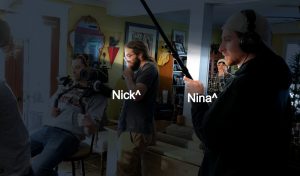
My mother helped the production in so many ways. I consulted her while casting, watching the top selection of audition tapes I had received. Ultimately, she helped me choose the perfect actresses.
During the production, she would spend time with the Actresses just chatting about life and answering their questions about Aphasia.
I remember on the last day of shooting, we were capturing a very emotional bedroom scene. My mother and I were in the other room watching the feed on my wireless Director’s monitor. We were intently watching the performance together…when suddenly, we both felt it. We looked at each other, held each other’s hands, and started crying.
Here were these two actresses playing out our life’s story before us. It occurred to me in that moment that the words I had written for the daughter saying to her mother were my OWN BURIED WORDS! I had never said these things to my mom myself! Because they were too hard to say…I didn’t want to hurt her…or show her my own deep level of hurt…I had to take over her entire home, transform it into a movie set with lights, crew, equipment…in order to let someone else tell my mom the dark secret pain I had been carrying.
We both hugged each other and started crying deeply. After the take I yelled “Cut! PRINT!” we walked into the bedroom and mother hugged them both crying saying “Thank you…thank you…thank you.” That was a really great take, and it made the final cut.
It was incredibly cathartic for us both and is one of the best experiences of my life. I now wish to live in a way where I carry no buried words in my heart between me and my loved ones.
Q. What is your favorite part about being her son?
My favorite part of being her son is that I have always had a strong female role model in my life. She is a no-BS kind of woman, and I LOVE that. For example, our favorite movie character is Ripley from Aliens. So, growing up my perception of the feminine is rooted in strength, willpower, intelligence, uncontainable fiery love, and a respect for all beings. But mostly…it’s a respect for self – no one determines our worth but ourselves.
But I’ll also say that I love sharing the arts with her, in particular movies and dance. When we dance, it’s like we are two parts of the Yin-Yang. I have her movement style ingrained in my body, both genetically and from childhood dancing together. We mirror each other so well, and it hits notes in our brains that can’t be expressed with words.
Q. What are the challenging aspects of caring for a person with Aphasia?
Well, I know most about caring for someone who has Expressive Aphasia, so that’s what I can speak to.
The easy answer is it’s challenging to have the patience to let them say it themselves and then knowing when to give them the break and offer a word or two. I feel it is typical for a normal-paced speaker to want to just “Fill in the _______” saying things like “You mean this?” “Is it that”, throwing words at them, but in doing that a caregiver can be obscuring the healing process of the person with aphasia finding the word on their own.
That is the healing, a person with Aphasia finding and saying the words they actually mean.
So, no favors are done by cutting them off, interjecting what you THINK they want to say. Just let them say it. If they need help finding the right word, they’ll show it.
But within that, what’s really hard is just accepting that you don’t know exactly what they want at times. Sitting with the confusion for a minute, really listening and watching. I felt like I always wanted to help…” solve the problem” “get what she needed” just “understand” as if something was always wrong, that she always needed something. Sometimes she just wants to say something, share a thought… like quit thinking so heavily into it, and let her process work itself out. Buried Words
Q. What would you wish to tell other caregivers?
I wish to share with other caregivers that regardless of the severity of the Aphasia, authentic-meaningful communication and sharing are still very possible.
In my experience, through dance and song, my mother and I say SOOOO MUCH to each other, and it meant even more to us in a time when her vocabulary consisted of 1) “Yes” and 2) “No.”
Through body language and facial expression, we would genuinely convey complex emotion, and feel our presence being shared.
Show up. Be present for your loved ones. That simple act could mean more for them than we’ll ever understand.
I wish to also convey that even though you may feel like an aspect of your relationship may have died with the brain trauma, that your relationship as a whole has not died. Mourn the loss of what was, but don’t put that burden on your loved one, for THEY ARE STILL THERE! And their own loss is of a kind that we can’t fully understand. Buried Words
With much love and compassion,
– Nicholas Orris
Recommend someone you know for the 1SpecialPlace Little Miracles! Mail us at info@1specialplace.com
- Tele-Speech Remediation of Stuttering: A Case Study - April 22, 2023
- Voice Changes During Puberty in Teenagers - April 11, 2023
- Vital Stim Therapy for Swallowing Difficulty - April 4, 2023

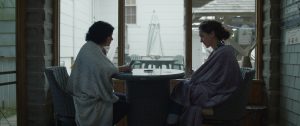
Leave a Comment
(0 Comments)